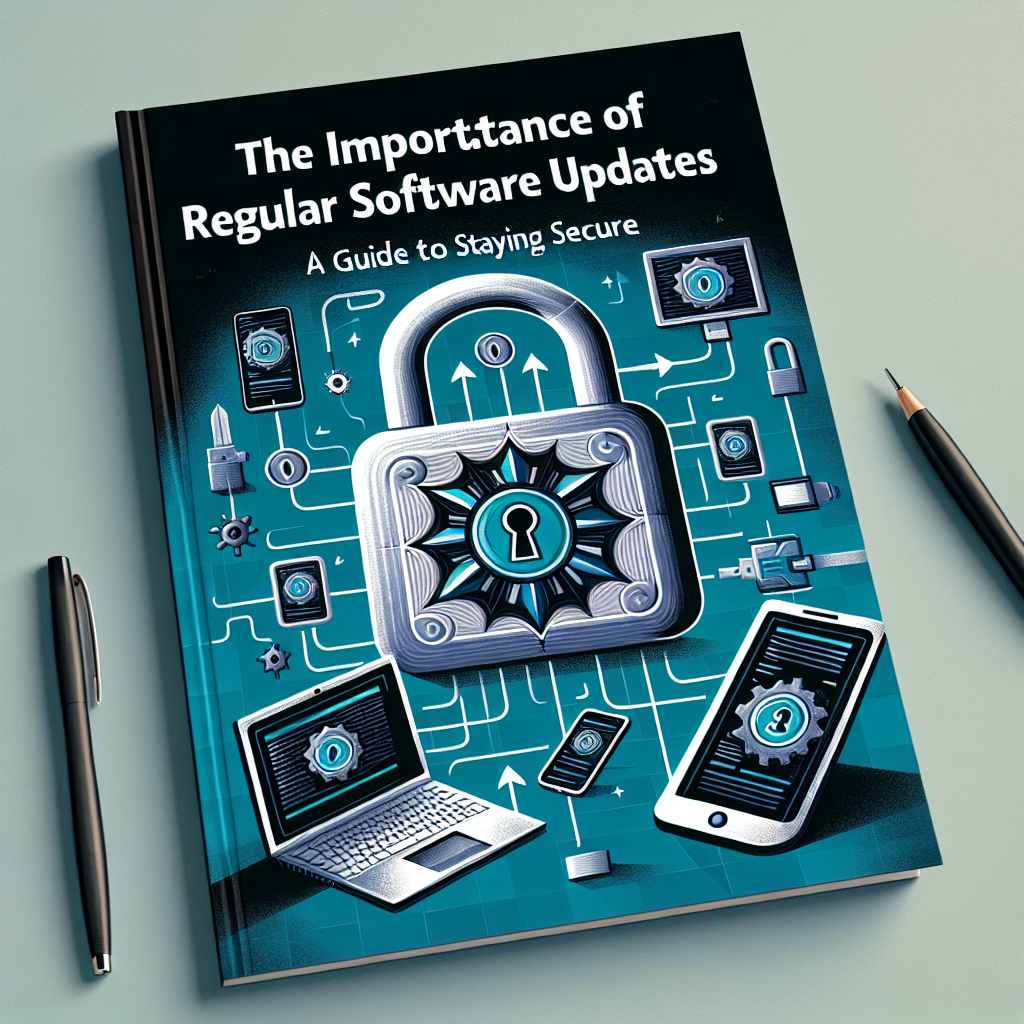No products in the cart.

The Importance of Regular Software Updates: A Guide to Staying Secure
The Risks of Ignoring Software Updates: Why Regular Updates are Crucial for Security
In today’s digital age, software updates have become a regular occurrence. From our smartphones to our laptops, we are constantly bombarded with notifications to update our software. While it may seem like a hassle, these updates are crucial for the security of our devices and personal information. Ignoring software updates can leave us vulnerable to cyber attacks and other security risks. In this article, we will explore the risks of ignoring software updates and why regular updates are crucial for our security.
One of the main reasons why software updates are important is because they often contain security patches. These patches are designed to fix vulnerabilities in the software that could potentially be exploited by hackers. As technology advances, so do the methods used by cybercriminals to gain access to our devices. By ignoring software updates, we are essentially leaving the door open for these hackers to exploit any weaknesses in our software.
In addition to security patches, software updates also often include bug fixes and performance improvements. These updates are not just about adding new features or changing the user interface, but also about making the software run more smoothly and efficiently. Ignoring these updates can lead to slower performance and even crashes, which can be frustrating and time-consuming.
Furthermore, software updates also play a crucial role in keeping our personal information safe. With the rise of online shopping and banking, we are constantly sharing sensitive information over the internet. Software updates help to ensure that the software we use to access these websites is secure and up-to-date. This is especially important for businesses that handle sensitive customer information. Ignoring software updates in a business setting can not only put the company’s data at risk but also the personal information of their customers.
Another risk of ignoring software updates is the potential for compatibility issues. As technology evolves, so do the systems and software that we use. By not updating our software, we run the risk of it becoming incompatible with other programs or devices. This can lead to errors and malfunctions, making it difficult to use our devices effectively. In some cases, outdated software may not even be able to communicate with newer versions, causing major disruptions in our daily tasks.
Moreover, ignoring software updates can also have legal implications. Many software companies have licensing agreements that require users to keep their software up-to-date. By not complying with these agreements, users may be violating copyright laws and could face legal consequences. This is especially important for businesses that use software for their operations, as they could face penalties and fines for not keeping their software updated.
It is also worth noting that software updates are not just limited to our personal devices. Many of the devices we use in our daily lives, such as cars and home security systems, also rely on software. Ignoring updates for these devices can not only put our personal information at risk but also our physical safety. For example, a security system with outdated software may not be able to detect and prevent a break-in, putting our homes and families in danger.
In conclusion, the risks of ignoring software updates are numerous and can have serious consequences. From security vulnerabilities to compatibility issues, not keeping our software up-to-date can leave us vulnerable to cyber attacks, compromise our personal information, and even put our physical safety at risk. It is crucial to regularly update our software to ensure the security and functionality of our devices. So the next time you receive a notification to update your software, remember the importance of staying secure and click that update button.
Staying Ahead of Cyber Threats: How Regular Software Updates Protect Your Data

In today’s digital age, technology plays a crucial role in our daily lives. From smartphones to laptops, we rely on various devices and software to stay connected, informed, and productive. However, with the convenience and efficiency that technology brings, there also comes the risk of cyber threats. Hackers and cybercriminals are constantly finding new ways to exploit vulnerabilities in software and gain access to sensitive information. This is where regular software updates come into play.
Software updates are essential for keeping your devices and data secure. They are designed to fix bugs, patch security holes, and improve the overall performance of the software. Ignoring these updates can leave your devices and data vulnerable to cyber attacks. In this article, we will discuss the importance of regular software updates and how they can protect your data from cyber threats.
First and foremost, software updates are crucial for fixing bugs and glitches in the software. No software is perfect, and even the most well-designed programs can have flaws that can be exploited by hackers. These bugs can range from minor inconveniences to major security vulnerabilities. By regularly updating your software, you ensure that these bugs are fixed, and your device runs smoothly without any unexpected crashes or errors.
Moreover, software updates often include security patches that address known vulnerabilities in the software. Cybercriminals are constantly looking for ways to exploit these vulnerabilities to gain access to sensitive information. By not updating your software, you are essentially leaving the door open for hackers to access your data. Regular updates ensure that these security holes are patched, making it difficult for cybercriminals to breach your system.
In addition to fixing bugs and patching security holes, software updates also bring new features and improvements. These updates are not just about security; they also enhance the overall user experience. For example, a software update for a messaging app may introduce new emojis or improve the app’s interface. While these may seem like minor changes, they can make a significant difference in how you use the software. By staying up-to-date with software updates, you can take advantage of these new features and improvements.
Another crucial aspect of regular software updates is compatibility. As technology advances, new software and devices are constantly being introduced. If you do not update your software, it may not be compatible with these new devices or programs. This can lead to compatibility issues, making it difficult for you to use your device or access certain features. By regularly updating your software, you ensure that it is compatible with the latest technology, making your device more efficient and user-friendly.
Furthermore, software updates also play a vital role in protecting your data from malware and viruses. Malware is a type of malicious software that can infect your device and steal sensitive information. These can be in the form of viruses, spyware, or ransomware. Software updates often include security measures to protect against these threats. By not updating your software, you are leaving your device and data vulnerable to these malicious attacks.
In conclusion, regular software updates are crucial for staying ahead of cyber threats and protecting your data. They not only fix bugs and patch security holes but also bring new features and improvements. By staying up-to-date with software updates, you can ensure that your devices and data are secure, compatible, and running smoothly. So, the next time you see a software update notification, don’t ignore it. Take the time to update your software and stay secure in the digital world.
The Benefits of Regular Software Updates: Improving Performance and Enhancing User Experience
In today’s digital age, software updates have become a regular occurrence for most devices and applications. From smartphones to laptops, and even household appliances, it seems like everything requires an update every now and then. While some may find these updates to be a nuisance, they actually play a crucial role in keeping our devices and data secure. In this article, we will explore the importance of regular software updates and how they can improve performance and enhance user experience.
First and foremost, let’s understand what software updates are and why they are necessary. Software updates are essentially new versions or patches released by developers to fix bugs, add new features, and improve overall performance. These updates can be for operating systems, applications, or even firmware for devices. They are necessary because as technology evolves, so do the potential threats and vulnerabilities. Hackers and cybercriminals are constantly finding new ways to exploit weaknesses in software, and updates are the developers’ way of staying one step ahead.
One of the main benefits of regular software updates is improved performance. As developers release updates, they often include bug fixes and performance enhancements. These updates can help speed up your device, reduce crashes and freezes, and improve overall functionality. For example, a software update for a smartphone may include battery optimization, resulting in longer battery life. Similarly, an update for a laptop may improve its processing speed and reduce lag. By regularly updating your software, you can ensure that your devices are running at their optimal performance.
Another advantage of software updates is enhanced user experience. Developers are constantly working to improve the user interface and add new features to their software. By updating your software, you can take advantage of these new features and improvements. For instance, a social media app may release an update that allows users to post videos, while a messaging app may introduce new emojis. These updates not only make the software more user-friendly but also keep it relevant and up-to-date with the latest trends.
Moreover, regular software updates are crucial for maintaining the security of your devices and data. As mentioned earlier, hackers and cybercriminals are constantly finding new ways to exploit vulnerabilities in software. By not updating your software, you are leaving your device and data vulnerable to these attacks. Developers often release security patches in their updates to fix these vulnerabilities and protect your device from potential threats. By regularly updating your software, you are essentially strengthening the security of your device and safeguarding your personal information.
In addition to security patches, software updates also include bug fixes. These bugs can range from minor glitches to major security flaws. By not updating your software, you are essentially leaving these bugs unresolved, which can lead to a compromised user experience or even data loss. For instance, a bug in a banking app could result in financial information being exposed to hackers. By regularly updating your software, you can ensure that these bugs are fixed, and your data remains safe.
In conclusion, regular software updates are crucial for improving performance, enhancing user experience, and maintaining the security of your devices and data. They may seem like a hassle, but they play a vital role in keeping our digital lives secure. So the next time you receive a notification for a software update, don’t ignore it. Take the time to update your software and reap the benefits of a faster, more secure, and user-friendly device.

Add comment
You must be logged in to post a comment.